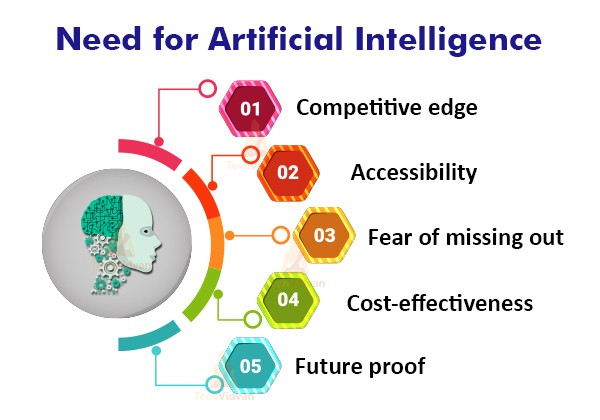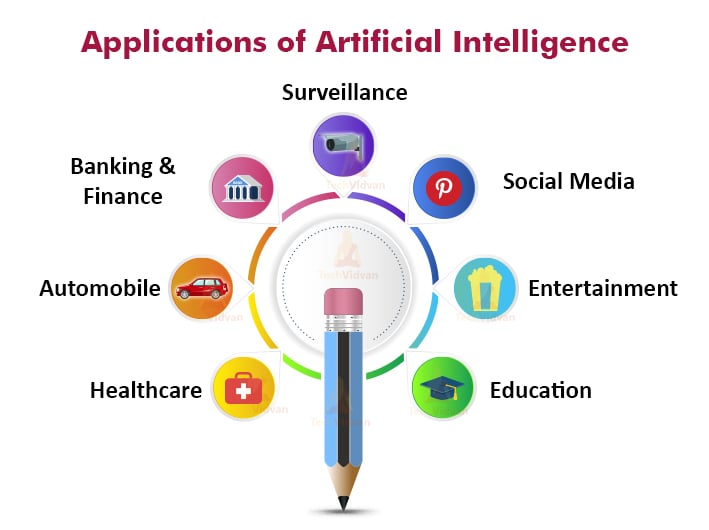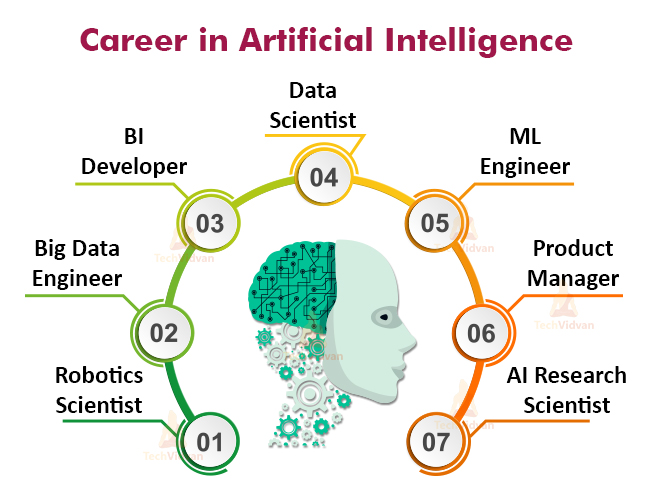AI Tutorial – Introduction to Artificial Intelligence
“The development of full artificial intelligence could spell the end of the human race. It would take off on its own, and re-design itself at an ever increasing rate. Humans, who are limited by slow biological evolution, couldn’t compete, and would be superseded”
-Stephen Hawking, Theoretical physicist
Many curious folks want to know more about AI, the basic functioning and about its nitty-gritty, but do not know where to start.
For all such curious folks, this article is a comprehensive AI Tutorial that would provide introduction to AI and mostly all the dimensions related to it. Consider this as a primer for all your future AI knowledge.
So, without any further delay, let’s get started.
Introduction to Artificial Intelligence
AI is a term that refers to technologies that make it possible to reenact human knowledge in machines and enable them to think like people, copy and replace their activities.
AI is that the ability of a machine to perform cognitive functions as humans do, like perceiving, learning, reasoning and solving problems. The benchmark for AI is that the human level concerning in teams of reasoning, speech, and vision.
Need for Artificial Intelligence
There are numerous reasons why AI is the need of the hour. Some of them being:
1. Competitive Edge
The organizations which mean to have a serious edge over their adversaries are banking upon AI advancements to acquire this.
Take the case of the Autopilot highlight offered by Tesla in its vehicles. Tesla is utilizing Deep Learning Algorithms to accomplish Autonomous driving. This was before, when there was only one element out of many, yet now it is characterizing the brand.
2. Accessibility
The establishment speed, availability, and sheer scale have enabled bolder computations to deal with progressively exciting issues. Not solely is the gear faster, expanded by specific assortments of processors (e.g., GPUs), it is moreover available looking like cloud organizations.
What used to run in explicit labs with access to super PCs would now pass on to the cloud at a lower cost. This has democratized access to the significant hardware stages to run AI, enabling duplication of new organizations.
3. Fear of Missing out (FOMO)
No typo, you read that right! Not simply us, organizations additionally feel the dread of passing up a major opportunity. To stay competitive and not get tossed out of the market, they need to adjust appropriately. This is done by putting resources into advances that would upset their enterprises.
Take the case of the financial part, where practically all the banks have put vigorously in chatbots with the goal that they won’t pass up the following rush of interruption.
4. Cost-Effectiveness
As with all other technologies, with time, AI is becoming more and more affordable. This has made it feasible for a lot of organizations that couldn’t bear the cost of them in the past to use these advances.
Organizations do not have that barrier of cost to implement AI.
5. Future Proof
One thing that we all need to comprehend is that future in AI is very safe .
Organizations can and ought to guarantee themselves to be future confirmation by actualizing AI advancements. On the off chance that this is where the world is going, why not to head in that equivalent course and be versatile to that change.
This is the best way to be technologically future proof for an organization.
Applications of Artificial Intelligence
These are some industries where AI is being used:
1. Healthcare
One of the most profound lying impacts which AI has made is in the Healthcare space. A gadget as normal as a Fitbit or an iWatch gathers a great deal of information like the calories consumed by a person, pulse, and so on.
This gadget, enabled with AI can screen and inform unusual patterns and even timetable a visit to the closest Doctor without anyone else. It is additionally of extraordinary assistance to the specialists who can find support in settling on choices and research with AI.
2. Automobile
With vehicles transforming from a motor with a body around it to a product controlled clever machine, the job of AI can not be thought little of.
The objective of self-driving vehicles (Tesla), takes up information from all Tesla’s running out and about and utilizes it in AI calculation.
With the help of this Autopilot feature, Tesla has achieved about Level 2 Autonomy on-street and wants to accomplish 100% Autonomy (Level 4) in the coming years.
3. Banking and Finance
The one business which has been the early adopter of Artificial Intelligence in the Banking and Finance Industry.
From Chatbots offered by banks, for instance, SIA by State Bank of India, to insightful Robo merchants by Aidya and Nomura Securities for independent, high-recurrence exchanging, the utilizations are countless. With time, the effect of AI on Banking and Financial Services would observe exponential development.
4. Surveillance
Simulated intelligence has made it conceivable to create Facial Recognition Tools utilized for observation and security purposes. This engages the frameworks to screen the recording continuously and identifying faces from them.
This technology has also been blamed for an infringement of the crucial right of security of people especially in democratic countries.
5. Social Media
Our activities on the internet and especially social media is presently not only a stage for systems administration and communicating.
It subliminally shapes our decisions, belief systems, and personality. Artificial Intelligence devices work quietly out of sight, giving us posts that we “may” like and promoting items that “may” be valuable. This is developed depending on our hunt and perusing history.
As of late, Instagram uncovered how it has been utilizing AI to alter content for the Explore Tab.
6. Entertainment
Media outlets, with the likes of Netflix and Amazon Prime, depend intensely on the information gathered by the clients. These streaming platforms give proposals dependent on the recently seen content. This is done to give precise recommendations as well as to make content cater to a larger part of the watchers.
AI-driven marketing platforms can affect audience targeting, generate campaign strategies, and make effective customer solutions.
7. Education
Not lagging behind in any sense, the combination of education and AI, also known as the EdTech sector is witnessing tremendous growth.
There is a large group of issues sitting tight for the usage of Artificial Intelligence, which include checking of copies and their assessment, Content maintenance methods, and recommend upgrades.
This would likewise help in stretching out the scope of instruction to regions where quality instructors can’t be available genuinely. Case-based reenactments offered by Harvard Business School are one such model.
Classification of AI
In broader terms, Artificial Intelligence can be classified as :
1. Weak AI
If the AI can take care of only a couple of predefined issues set, it is called Weak AI. It revolves around one explicit goal. Weak AI simulates human cognition. It has the potential to profit society by automating time-consuming tasks and by analyzing data in ways in which humans sometimes can’t.
The model for this is a poker game in which a machine beats a human with no human intercession.
2. General AI
If the profitability of the framework is equal to that of a human, it is called General AI. This involves a system with comprehensive knowledge and cognitive computing capabilities such that it’s performance is indistinguishable from that of a person’s .
A real-life use case of this can be IBM Watson or even Power BI.
3. Super AI
When the profitability of the framework is more than that of a human, it is Super AI.
Some argue that advances in AI will probably end generally reasoning systems that lack human cognitive limitations. At present, use instances of this sort of AI are still being developed.
Benefits of Artificial Intelligence
1. Increased Efficiency
Machines are highly efficient in contrast to the human workforce. This is because they can complete monotonous tasks effectively without taking a break and irrespective of the working conditions.
Take the example of Power BI. Earlier, time was spent in sifting, isolating, and utilizing the information in MS Excel, Power BI utilizes AI to do the entirety of this (and significantly more) autonomously.
This expands the effectiveness of the framework and spares significant time for the investigator to utilize it somewhere else.
2. Reducing Human Risk
A lot of places wherein it is hazardous for a person to be truly present.
Man-made brainpower can be useful in such cases since it would empower the machines to have the option to settle on choices continuously. A case of this is a remote ocean boring at the sea bed where there is a high danger of human life.
3. Aid in Decision Making
This is the domain where AI has successfully paid dividends. AI has the capacity to analyze a great deal of information in a brief time frame. This is helping people improve decision making. Take the case of an investor who needs to conclude whether to give out a credit or not.
This can be highly effective in verticals like portfolio management. This would help in a more astute and quicker dynamic for the investor.
4. Availability
Machines, in contrast to people, don’t have to take rests. They can work nonstop.
Now, we can depend on machines for keeping up required manufacturing units running with their judgment which would prompt 24×7 creation units and complete mechanization.
Career in Artificial Intelligence
For those interested in pursuing AI as their career, interesting options are available. Some of these job profiles are:
Summary
AI has turned out to be a major disrupter in the field of technology across industries. We can have systems which exhibit intelligent behavior, learn, demonstrate, explain, and advice its users as well as creating system that understand, think, learn, and behave like humans.
It is imperative to learn to use it more effectively, as the dynamics of our work and our workplaces are going to change forever.



